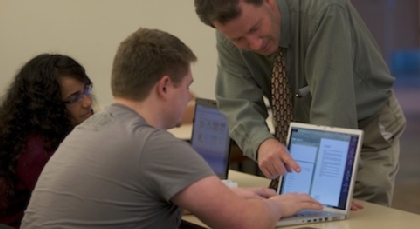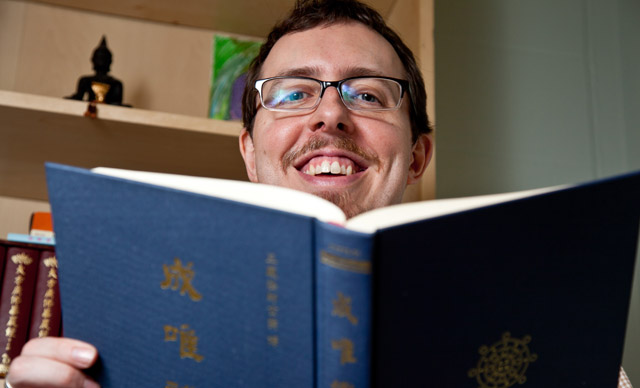Page 430 • (12,552 results in 0.047 seconds)
-
Upcoming Events view images descriptions print Select which month(s) you would like to print: Close
-
. Accolades Diversity Advocate Award (PLU Diversity Center), 2004 Winner, American Society for Engineering Education Best Research Presentation Competition, NASA Langley Research Center, 2001 PLU Center for Teaching and Learning Faculty Teaching Award, 2000 Cornell University Clark Teaching Award, 1992 Department of Education Fellowship, 1992-1994 History paper published in the Harvard College Forum (The Academic Review), Volume 5, 1989 Professional Memberships/Organizations American Physical Society
-
dangerous spirits. These posts only stay at the entrance for a year and are replaced following the harvest sacrifices where the ancestors of the chief are honored. Following the ceremony, the old posts from the year before are buried, in an imitation of burying a human body. (Roy, 59) – Michaela Thompson ’16 (History and Anthropology) Sources Cullivan, Lauren. “The Meaning behind the Marks: Scarification and the People of WA.” African Diaspora ISPs. Paper 4, 1998. Roy, Christopher D. “Mossi Chiefs
-
interview the son of a survivor of the Armenian genocide. “His input just opened this other dimension to my research,” Marks said. “It essentially brings history to life.” It may seem confusing why the systematic death of almost 600,000 Armenians took place. Through Marks own research she found the area to be quite “cosmopolitan.” But as the Ottoman Empire begin to recede into the desert, the rise of Turkish nationalism felt threatened by any different identity – especially the Armenians. While Marks
-

commitment, passion and experience of the business school’s faculty and – in the global management category – also to PLU’s long history of getting our students abroad and welcoming international students to campus.” The Princeton Review compiled the lists using data from its national survey of 19,000 MBA students attending 301 business schools profiled in its book, Best 301 Business Schools: 2010 Edition, published in October 2009. The 80-question survey asked students to report on classroom and campus
-
of the First Saudi State in the 18th Century” Amanda Davis, “The Critiques Behind the Criticism: A Look at the Controversy Surrounding the Holocaust’s Pope” Emily (Akira) Ibarra, “Praying to the Divine Pillar: Asherah, Ancient Judaism, and Private Religion” Maryn Johnston, “One True Religion? The influence of History and Politics on Karl Barth’s Theology” Kristen Lee, “Bonhoeffer and Birth Control: Ecclesiological Insights for Contemporary Discourse” Loriel Miller, “Gregory’s Rome: From Wealth
-
, understanding forgiveness… In this practice, quiet your mind and become aware of your breath. Allow yourself to find the pace your body wants to go. Since the path is two-way, those going in will meet those coming out. You may “pass” people or let others step around you. Do what feels natural. Walk the labyrinth with an open mind and an open heart. Each time you walk the labyrinth you become more empowered to find and do the work for which you feel your soul is reaching. History of Labyrinths Labyrinths
-

written about this time period, as far as examining its reach in developing Chinese society. According the the selection committee, they were “particularly impressed with the clarity of writing and the intellectual breadth of the dissertation, which necessitated dealing with a wide range of Chinese materials that span the entire history of Buddhism in China. The result is an impressive contribution to our knowledge of the complex responses by modern Chinese Buddhist teachers and intellectuals to
-
Literature. Prof. Simpson-Younger comes to us most recently from Luther College, our Iowa ELCA cousin, where she served as a visiting faculty member. She received her PhD from UW-Madison in 2012 and her research focuses on acts of watching vulnerable bodies in the early modern period. A reader at the Folger Shakespeare Library, Simpson-Younger is also very interested in questions of book history, and she integrates manuscript evidence (including an actual sleeping potion recipe) into many of her
-

at PLU will bring to bear some of Washington’s finest resources to help combat these issues.” PLU has a rich history of working closely with the military community. Located just 4.9 miles from JBLM, PLU is ranked fourth among regional universities in the West in the 2015 U.S. News Best Colleges for Veterans list, and PLU has been named one of the top Military Friendly® private universities in the country for the sixth year in a row by Victory Media. PLU partners with the United States Department
Do you have any feedback for us? If so, feel free to use our Feedback Form.


